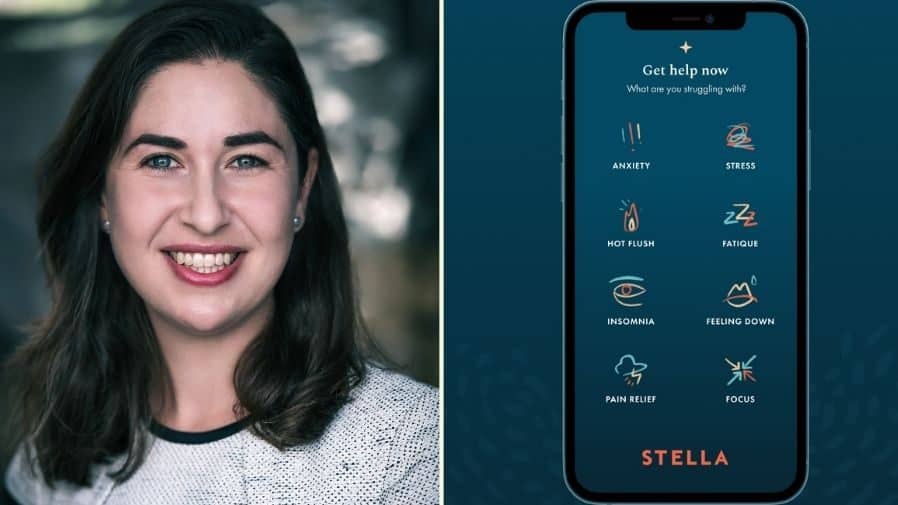The news is just in that Vira Health has raised £1.5 million in a seed funding round led by LocalGlobe and MMC Ventures, with investment from angels including Hearst Ventures’ Megumi Ikeda, Elvie’s Andrea Zitna, and former Spotify executive Sofia Bendz.
The announcement comes as Vira Health prepares for the launch of their first app, Stella in August, which acts as a health assistant as women go through menopause. The funding will support Stella’s launch in other markets and Vira Health’s expansion into other women’s later-life health areas.
A focus on women’s health
Vira Health was founded last year by Andrea Berchowitz and Dr Rebecca Love. Berchowitz developed the idea after spending 10 years at McKinsey, where she consulted in the public and social sectors on issues around women’s health and family planning, before working for the Bill and Melinda Gates Foundation on women’s health in the Middle East.
Despite enjoying her work, Berchowitz found it wasn’t exactly what she wanted, “Leading a foundation in the Middle East and working women’s health was wonderful, and women’s health was what I wanted to do,” Berchowitz told UKTN, “but advisory, charity, and philanthropy roles weren’t at the heart of driving innovation. And I wanted to be at the heart of driving innovation.”
Meeting her co-founder, Dr Love’s specialist area was medical sciences; they realised that menopause was an area frequently overlooked in women’s health. And, from that, the idea of the Stella app was born.
A digital health assistant for menopause
The menopause is a fact of life for half the population, but despite that, it can be down to luck what, if any support, women get. “If you’re lucky, you might have a great doctor,” Berchowitz told us, “You’ll have a conversation about menopause, your options, and treatment. But the truth is, is that’s just not happening for many women.”
The consequence is not just personal, but also economic. Menopause usually occurs in the late-40s to early-50s, exactly when women are stepping into senior roles. Eighty per cent report that their symptoms interfere with their daily lives, and in the UK, menopause results in 14 million lost working days and a million premature career exits.
Although Stella does not replace professional medical care, it helps ensure the support that goes around that care takes place. “It’s hard to stick to the behaviour changes that are part of treating menopause,” Berchowitz explained, “getting enough sleep, changing your direct, the need to do pelvic floor exercises. Stella makes all those things easier for a woman to fit into her life.”
The app has been developed with medical professionals and offers a 12-week programme that will adapt to the needs and symptoms of the user, making sure it always offers appropriate suggestions and moves at the right speed. Although it can stand alone, it is intended to supplement a doctor’s advice by providing the guidance, motivation, and prompts that a doctor will not be there to offer.
A long-term, women-focused business model
Berchowitz sees the femtech growing with its users. While it, and the Stella app, are focused on menopause now, it will move over the next five to ten years to address other issues that women face in later life, from osteoporosis to cardiovascular disease. Given the impact menopause can have on women leaders, Berchowitz sees the app playing a big role in workplace wellness, making the B2B market a key target for expansion.
Stella starts to rebalance the medical and tech sectors’ away from men, but there is still some way to go. Berchowitz told us some potential investors were less receptive, “you could tell the investors who were prepared to learn versus the ones that had a preconceived notion that menopause was just something you get through, that isn’t that serious.” However, it meant that when they found angels like Matt Robinson and Simon Lambert, they had investors who fully understood the importance of what they were doing.
Berchowitz is confident that it is one of a growing number of signs that gender issues are getting through. “I think the numbers paint a picture about how hard it is for female founders. It is tough, but I am hopeful that there is a change, we are seeing an increase in funding for female founders, and an increase in funding for women’s health,” she told us.
Having founded, and had successful funding round, during the pandemic has been unusual, Berchowitz notes that she still hasn’t physically met most of her investors. However, it has created a new health landscape in which people are more familiar with using digital health services and Berchowitz is excited about the potential, “we have the opportunity to change the long-term health trajectory of women through menopause and beyond.”
Interview by Akansha Srivastava
The post London femtech scores £1.5M seed funding for helping women cope with menopause appeared first on UKTN (UK Tech News).


